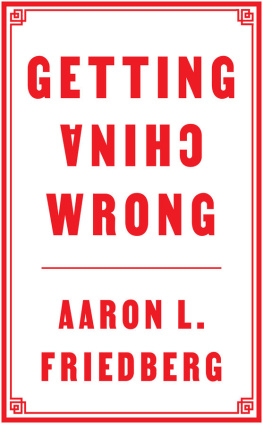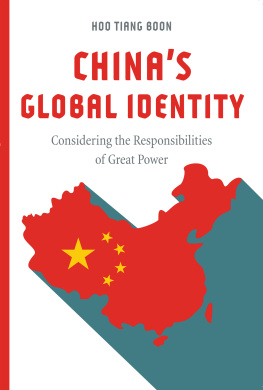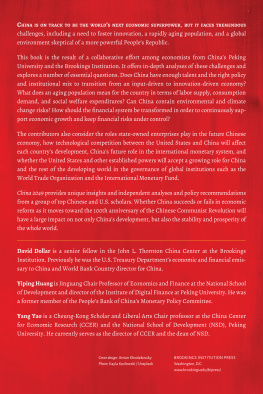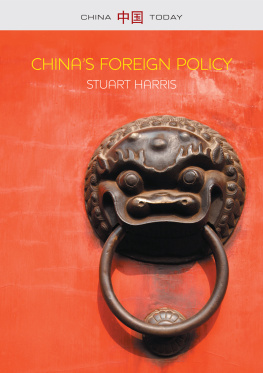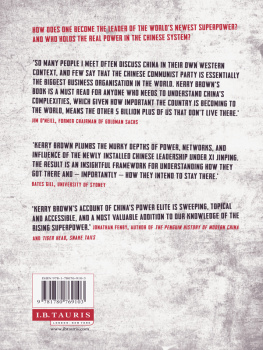CONTENTS
List of Illustrations
- Chapter 2
- Chapter 4
- Chapter 6
List of Box
- Chapter 3
List of Map
- Chapter 5
Guide
Pages
Praise for Aaron Friedberg
A decade ago, Aaron Friedberg courted unpopularity with A Contest for Supremacy, a book anticipating the imminent failure of engaging China at any price. His warnings were demonstrably worth heeding. Now in Getting China Wrong he makes the case that the United States and other democracies still underestimate the struggle ahead. But this is no counsel of despair: instead, Friedberg articulates a multi-layered action agenda, arguing that the best form of defense could well involve a willingness to impose costs.
Rory Medcalf, Head of the National Security College,
Australian National University, and author of Indo-Pacific Empire
A telling account of how and why policy-makers, academics, and business embraced a form of engagement with China that proved to be a sincerely optimistic but hopelessly wrong gamble. A trenchant and accessible foray into the geopolitics of our time and our future.
George Magnus, Research Associate,
China Centre, University of Oxford and SOAS
In Getting China Wrong, Aaron Friedberg lays out a balanced and practical approach for managing relations with China. Most compellingly, he argues that liberal democracies must begin by taking their own side in this rivalry, making clear the stark differences of a future defined by the Chinese Communist Party. This book is essential reading for anyone seeking to navigate a multipolar world order.
Admiral John Richardson, USN (Ret.),
31st Chief of Naval Operations
Friedbergs Getting China Wrong nails down half a century of mistaken American assumptions about Chinas future path. This essential non-partisan primer highlights the increasingly bold strategy of the Chinese Communist Party to defeat Western expectations.
Franois Godement, Senior Advisor for Asia,
Institut Montaigne, Paris
A splendid book with deep insights into the nature of the Chinese Communist Party dictatorship and an urgent message about the need to uphold and expand the liberal international order in Asia.
Nobu Kanehara, former Deputy National
Security Advisor to PM Abe of Japan
Dedication
For Nadge
Ma chre femme, je te remercie pour tout.
GETTING CHINA WRONG
Aaron L. Friedberg
polity
Copyright Aaron L. Friedberg 2022
The right of Aaron L. Friedberg to be identified as Author of this Work has been asserted in accordance with the UK Copyright, Designs and Patents Act 1988.
First published in 2022 by Polity Press
Polity Press
65 Bridge Street
Cambridge CB2 1UR, UK
Polity Press
101 Station Landing
Suite 300
Medford, MA 02155, USA
All rights reserved. Except for the quotation of short passages for the purpose of criticism and review, no part of this publication may be reproduced, stored in a retrieval system or transmitted, in any form or by any means, electronic, mechanical, photocopying, recording or otherwise, without the prior permission of the publisher.
ISBN-13: 978-1-5095-4513-1
A catalogue record for this book is available from the British Library.
Library of Congress Control Number: 2021946893
The publisher has used its best endeavours to ensure that the URLs for external websites referred to in this book are correct and active at the time of going to press. However, the publisher has no responsibility for the websites and can make no guarantee that a site will remain live or that the content is or will remain appropriate.
Every effort has been made to trace all copyright holders, but if any have been overlooked the publisher will be pleased to include any necessary credits in any subsequent reprint or edition.
For further information on Polity, visit our website:
politybooks.com
Preface
Writing about contemporary China from the perspective of an American concerned with US and wider Western strategy towards that country is like trying to hit a very fast-moving object from the pitching deck of a ship at sea: both the target and the platform from which it is being observed are in constant, if irregular, motion.
This book was completed during the summer of 2021. Since that time, there have been a number of significant developments, many of which (like the USUKAustralia nuclear submarine deal and Xi Jinpings recent crackdown on Chinas high-tech giants) are not discussed here. Between the writing of this preface (in the fall of 2021) and the publication of the book (spring 2022), there will no doubt be other noteworthy incidents and occurrences.
That said, the overall trajectory of events is already quite clear and, at least for the foreseeable future, nothing seems likely to deflect it. China is moving towards deepening political repression, expanded economic statism, and a more aggressive posture towards the United States, its partners and allies. Albeit belatedly and with an as yet insufficient sense of urgency and common purpose, the democracies have begun to face up to these facts and the dangers they pose, and to start the painful process of hammering out new policies with which to meet them. What remains to be seen is whether they can do so quickly enough to deter overt aggression while better defending their societies and economies against the subtler threats of penetration, manipulation, and exploitation.
As regards China, what has happened over the last several months is consistent with the broad patterns described here and with the overarching explanation offered for them. At home, the Chinese Communist Party brooks no opposition to its rule, claims for itself the authority to exert control over every aspect of social, political, and economic life, and uses that control to tighten its grip on its citizens and to build up the nations coercive power on the world stage. Xi Jinpings recent directives extending ideological indoctrination down to the primary school level, cracking down on video games and pop culture, and reining in Alibaba, Tencent, and other nominally private companies are merely the latest manifestations of the normal functioning of Chinas Leninist political system.
Similarly, Beijings stepped-up military pressure on Taiwan, dramatic test of a new type of hypersonic missile, and strikingly confrontational approach to dealing with a freshly elected US administration represent a continuation of trends that have become unmistakable over the course of the last two decades. As their assessments of Chinas relative strength have grown more positive, its leaders have pushed harder and more openly to reshape the world in ways intended to insure the longevity of their regime, first by reestablishing their country as the dominant state in eastern Eurasia, and ultimately by displacing the United States as the preponderant global power.
In his first year in office, Joe Biden sought to shed some of the crude and counterproductive aspects of Donald Trumps approach to dealing with China. As of this writing, however, Biden has continued in many respects to follow the main lines of policy laid down by his predecessor. At least in theory, his administration has accepted the need to reexamine the assumptions underpinning the entire USChina economic relationship, leaving in place for the moment most of the tariffs, export controls, and investment regulations that it inherited and even adding a few of its own. Top officials have also stressed the importance of shoring up the balance of power in the Indo-Pacific, both by strengthening US military capabilities and by working with allies and partners in the region and beyond.

